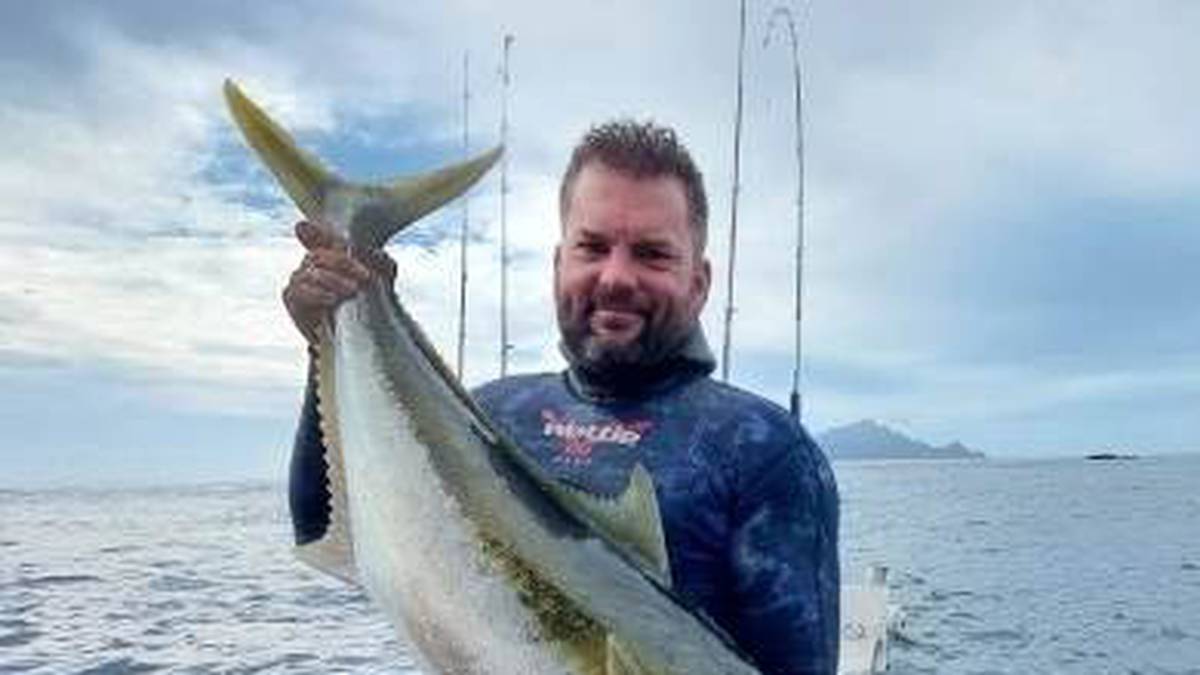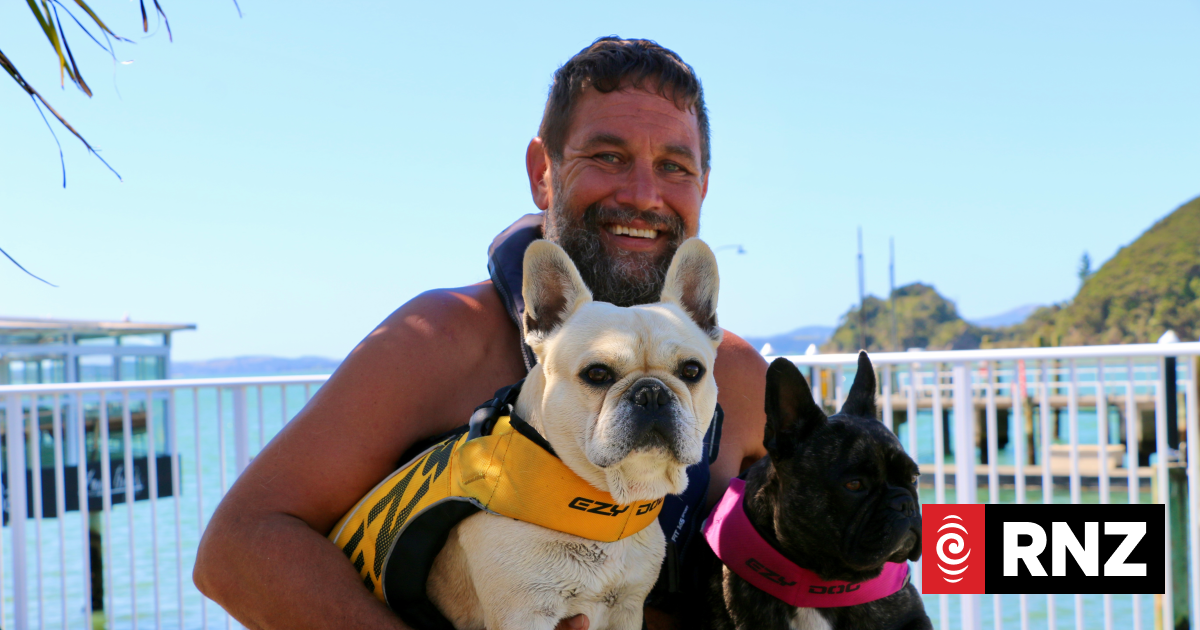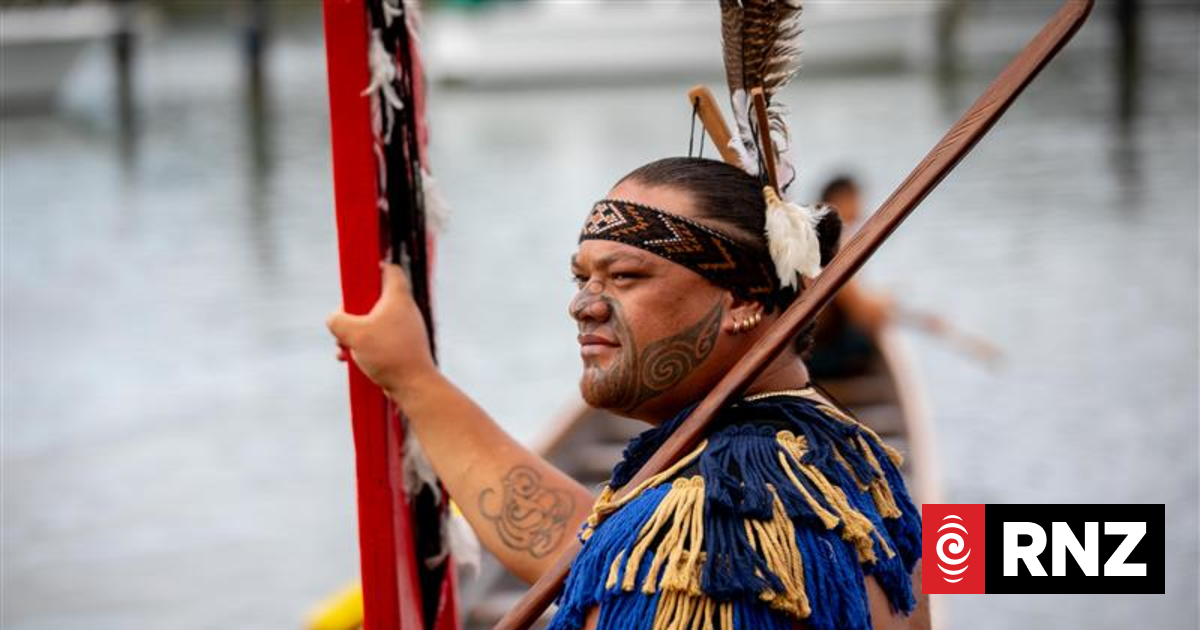Steven King with the kingfish he was unwilling to share with a shark.
A Whangārei man was forced to defend himself against a “massive” shark that zeroed in on him while spearfishing near the Hen and Chickens Islands.
Just over a week ago, Steven King was spearfishing in the deep waters near a well-known reef when he was suddenly confronted by a four-metre-long bronze whaler.
He had just finished a 10 minute battle with a 20kg kingfish he had speared that ended with the pair in the shallows of the reef.
“Then a big bronzy showed up,” he said. “And it was all up real close and personal.”
Advertisement
King’s kids and his wife, Alicia, watched from the boat right next to him in the water as the shark chased the kingfish, trying to bite it.
“The shark was thrashing up a storm, flicking water all over them,” King said.
Still, he kept his grip on the gun at the other end of the line.
Advertisement
“Then the shark tried to have a go at me.”
King said the bronze whaler came up with its mouth wide open.
“I could see its teeth. I could see right down its throat.”
/cloudfront-ap-southeast-2.images.arcpublishing.com/nzme/S5RVPBFVRTR5NTQ7GMVQHPH5WY.jpg)
But the shark veered, swimming further away before turning back in King’s direction.
“It was coming right for me,” he said.
Advertisement
King made the snap decision that if the shark again went for him with his mouth wide open, he would have to defend himself.
During the fracas he had called for his wife to toss him a second speargun from the boat.
He used the speargun to jab the advancing shark on the side of its head in a bid to repel it.
“I poked him a bit too hard,” King said.
“I had the kingfish in my left hand [and] the gun in my right hand, with its flopper stuck in the shark.”
A flopper being a spearhead with barbs that open upon contact to hold a fish on the spear once it has been shot.
Advertisement
King, already “puffed and gassed” from his earlier tussle with the kingfish, had to let the gun go.
“The shark buggered off with that.”
King said there hadn’t been enough time to panic.
“I was like – man, it’s such a good fish, I don’t want a shark to get it. But I ended up with the fish, so I was happy.”
The former commercial freediver, who recently spoke to the Advocate about the time he accidentally caught a whale, said he had always had shark encounters – just not like this one.
Even his wife, Alicia, had exclaimed, “Holy s***, that’s a massive shark”.
Advertisement
“I’ve had them pinch fish before, and you see them quite regularly, but that one gave us a bit of a fright,” King said.
“That one was just out of the blue. I’ve never had a shark have a go at me.”
Department of Conservation shark expert Clinton Duffy said bronze whalers reach a maximum length of about 3.3m.
Given the size of the shark King encountered, Duffy said it could have been a dusky shark which can sometimes be more aggressive than bronze whalers and grows up to 4m long.
“In Australia the dusky shark, Carcharhinus obscurus, is often misidentified as the bronze whaler. The two species are superficially very similar […]”
But the size of their teeth and dorsal fins sets them apart, Duffy explained.
Advertisement
“Dusky sharks have been seen in the outer Hauraki Gulf but are much rare than bronze whalers.”
Duffy said if the shark involved had been a dusky shark then that could explain why it was so aggressive.
“[Bronze whalers] are not usually aggressive toward humans but are attracted to struggling fish and fish blood so often steal off spearfishers.”
However, Duffy noted that can change if the sharks perceive divers as potential competitors for fish.
Bronze whalers are one of the most abundant large shark species in the country’s coastal waters and the most likely to be encountered by divers from Cape Reinga down to Cook Strait.
In summer, they live in shallow coastal waters – reefs, bays, estuaries and surf beaches – before moving further offshore for winter.
Advertisement
Their teeth are designed for grasping small prey, such as slippery fish and squid, rather than for cutting big hunks of flesh.




